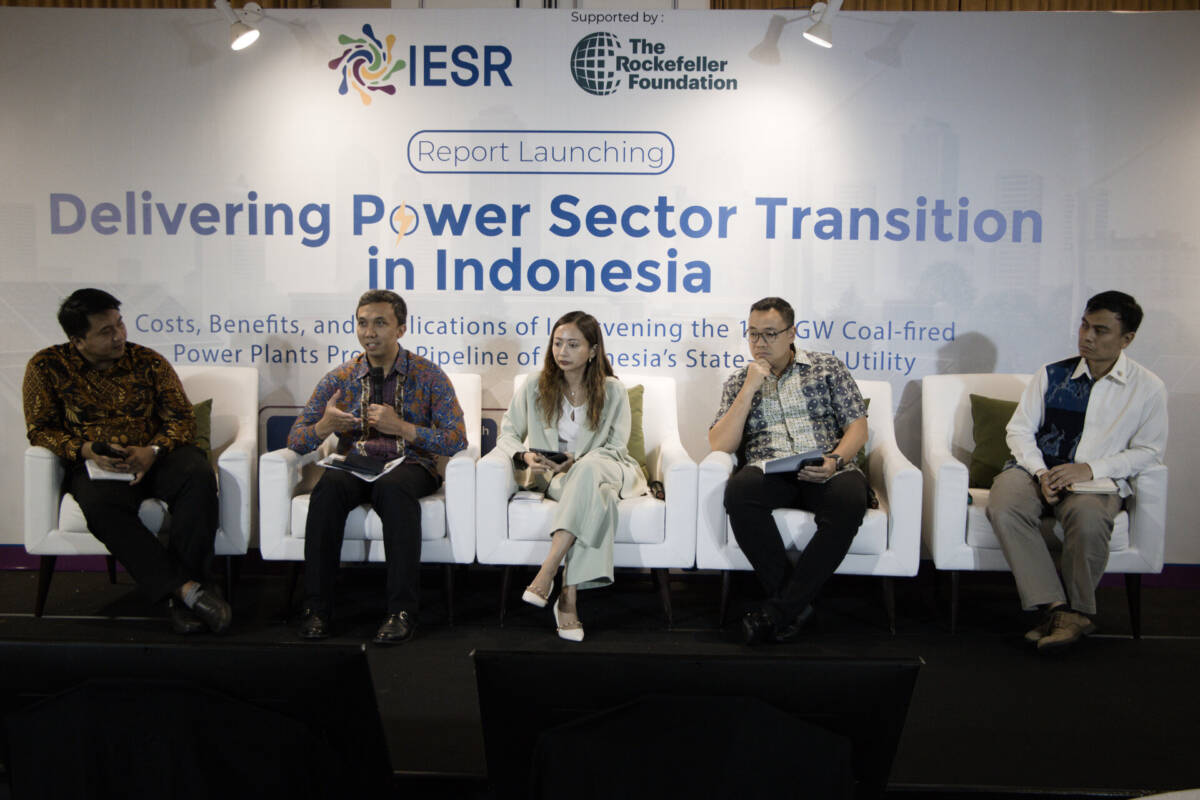Jakarta, 30 May 2023 – Transforming the power sector into a low carbon energy system is an absolute necessity. One of them is to pursue emission reduction targets in order to maintain the increase in global average temperature to be at the level of 1.5 ℃. It is stated in the IPCC AR6 Synthesis Report that from 2011 – 2020, the average global temperature has increased by 1.1℃, amidst various human activities that continue to produce emissions. The energy sector is one of the largest contributors to emissions in Indonesia after forestry and land use. Plans to develop fossil-based energy generators are an obstacle in efforts to reduce emissions from the electricity sector.
Indonesia is in the top three rankings as a country with CFPP in the pipeline after China and India. A total of 13.8 GW of CFPP with various development progresses have been included in the PLN RUPTL 2021 – 2030.
Fabby Tumiwa, Executive Director of the Institute for Essential Services Reform (IESR), during the launching report and public discussion ‘Delivering Power Sector Transition’ said that one of the reasons for the increase in the global average temperature is the burning of fossil fuels.
“Thus, reducing coal capacity in the electricity system is one of the key actions in efforts to achieve the target of the Paris Agreement, which is to keep global temperature rise at 1.5 degrees Celsius,” he said.
In the Indonesian context, commercial issues have become one of the aggravating factors for the coal phase-out. Dadan Kusdiana, Director General of New and Renewable Energy and Energy Conservation, Ministry of Energy and Mineral Resources, conveyed that coal phase out still requires joint encouragement from all parties.
“We still have to fight for this (phasing out coal and adding renewable energy capacity). Because, according to current regulations, they are not in the same regulations. However, I want to encourage that the process must be done in the same rhythm,” he said.
IESR considers the coal phase-out in Indonesia as an important matter, because as one of the recipients of the Just Energy Transition Partnership (JETP) funding commitment, Indonesia has an obligation to reach a peak emission of 290 million tons of CO2 in 2030 and increase the renewable energy mix by 34% in 2030.
“To achieve the target of the Paris Agreement, the target set by JETP is actually not enough. However, this can be a starting point for accelerating the development of renewable energy in Indonesia,” explained Raditya Wiranegara, IESR Senior Researcher who is a member of the study author team.
Raditya added that in the Delivering Power Sector Transition report, IESR found that of the 13.8 GW PLTU planned for construction in the 2021-2030 RUPTL, 2.9 GW could be cancelled, 10.6 GW needed to end operations early, and 220 MW were considered for repurposing with renewable energy-based power plants such as biomass.
Akbar Bagaskara, power sector researcher in IESR added that the reduction in emissions will be directly impact the cost of the electricity system.
“The cancellation of CFPP construction accompanied by early retirement for the existing CFPP will be the best scenario for reducing emissions. Cancellation of CFPP in the pipeline will reduce emissions significantly. However, it is felt that this is still not optimal to achieve the JETP target in 2030,” he added.
IESR calculates that to achieve the JETP target, at least 8.6 GW of coal must be retired before 2030, followed by the phase out of 7.6 GW of coal-fired power plants before 2040.
Gigih Udi Utomo, Director of Energy Conservation at the Ministry of Energy and Mineral Resources, commented that the coal phase-out and the cancellation of the CFPP need to be seen as two different things.
“When we talk about the early retirement road map, we are referring to the mandate of Presidential Decree 112/2022. Early retirement is for existing CFPPs, while this 13.8 GW topic is for CFPP that is not yet operating and is already in the RUPTL, so that each of the options and scenarios offered in the study needs to be explored again and requires dialogue with relevant stakeholders,” he explained.
Independent Power Producers as PLN’s partner in meeting national electricity demands state that energy business actors are basically willing to support the government in the transition.
“However, what needs to be noted is that the participation of projects that will be canceled or CFPP units whose retirement age will be accelerated must be based on the voluntarily principle not mandatory because basically the project owner has secured the contract with PLN,” said Chairman of the Association of Indonesian Private Electricity Producers (APLSI), Arthur Simatupang.
Kirana Sastrawijaya, Senior Partner of Umbra, reminded that it is important to review the PPA (Power Purchase Agreement) document between IPPs and PLN especially for the proposal to cancel the CFPP construction.
“Presidential Decree No. 112/2022 can be used as a legal basis for phasing out coal, but there needs to be list of criteria of which CFPPs unit eligible for phase-out. This Presidential Decree can also become a basis for canceling a CFPP, although it does not specifically talk about cancellation,” she said.
In the context of legal law, Karina stressed that potential legal disputes could occur. So, in addition to the applicable government regulations, the contract document (PPA) must be a reference document because it regulates in detail various restrictions on the parties and funders.

